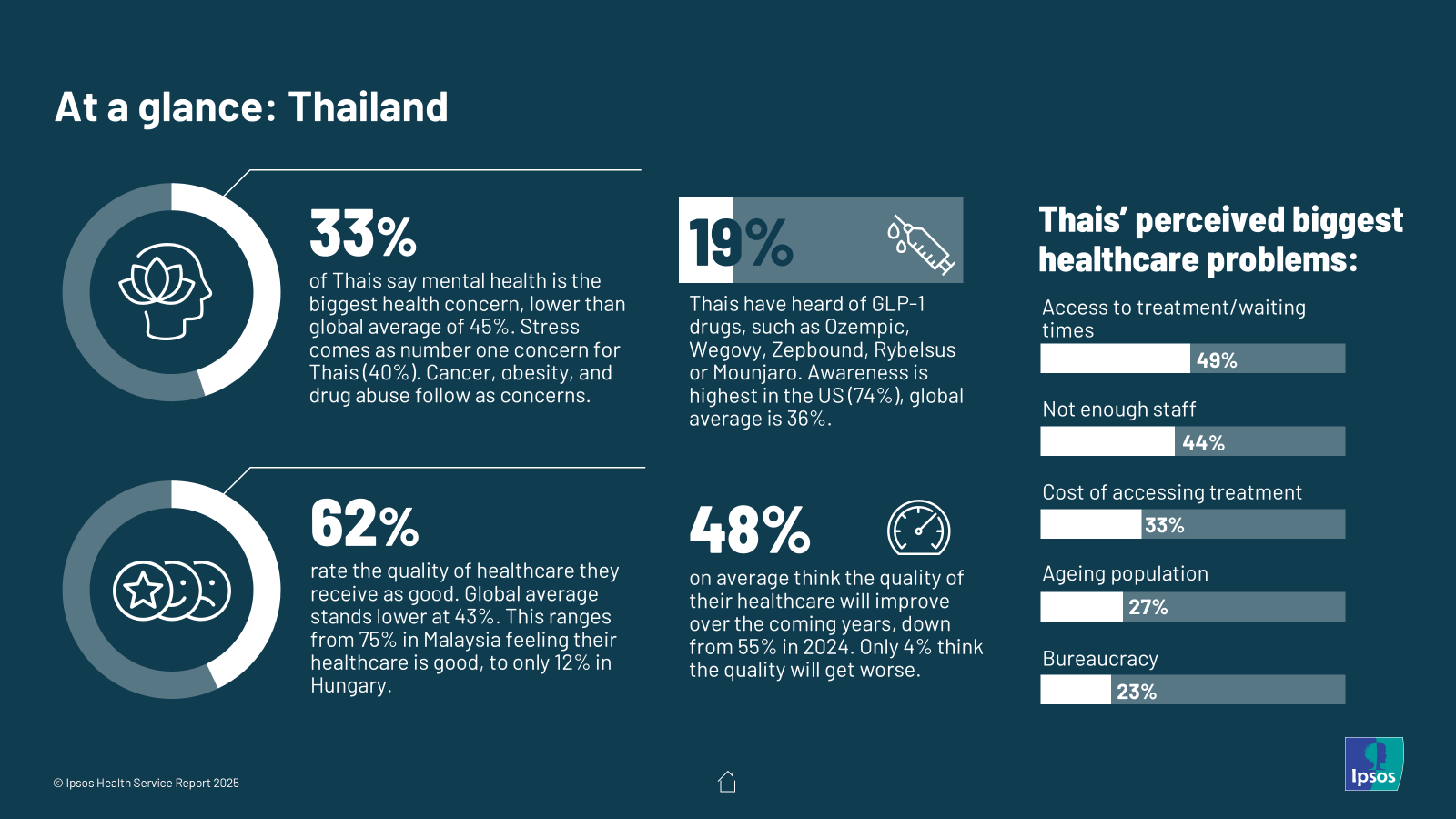

Ipsos Health Service Report 2025: A Closer Look at Thailand's Health Landscape
The newly released Ipsos Health Service Report 2025 provides a vital snapshot of public perception regarding health systems and challenges across 30 countries. For Thailand, the data reveals a unique set of priorities, with access to care and escalating stress levels overtaking global health concerns like mental health and obesity.
Stress seen as the country's biggest health problem
While the Global Average sees mental health as the biggest concern (45%, up from 27% in 2018), Thailand exhibits a different set of primary worries:
- Stress is the top health problem perceived by Thais at 40%, significantly higher than the global average.
- Mental health follows at 33%, which is below the global average but still a major issue.
- Cancer (32%) and Drug Abuse (30%) also rank high.
- Obesity is a comparatively lower concern for Thais at just 11%, sharply contrasting with the global focus (25%).
The heightened concern around stress (40%) and mental health (33%) in Thailand is particularly pertinent given current national news. Recent reports, such as the Thai Health Report 2025, highlight an ongoing mental health crisis, with a significant rise in issues like stress, anxiety, and depression, especially among young people and the pre-senior group (45-59 years old). Thailand's Department of Mental Health has noted a substantial increase in psychiatric and substance abuse patients since 2020, underlining the reality behind the public's perception of high stress.
Healthcare system access: the biggest practical challenge
When asked about the biggest problems facing the Thai healthcare system itself, practical issues around access and infrastructure dominate the public’s mind.
Nearly half of Thais cite access to treatment and long waiting times as the number one system issue (49%). This is followed by the lack of enough staff (44%), cost of accessing treatment (33%), ageing population (27%) and bureaucracy (23%).
High marks for current care quality, but optimism is cautious
Despite the challenges of access, Thais generally rate the quality of the care they currently receive positively. 62% of Thais rate the quality of healthcare they and their family have access to as good, higher than the Global Average of 43%. While another 37% rate it as poor. This rating places Thailand among one of the more positive countries, though below the APAC frontrunners, Malaysia (75%), Singapore (68%) and Australia (64%).
Looking ahead, 48% of Thais expect that the quality of healthcare they have access to locally will improve over the coming years, demonstrating a notable degree of optimism, especially when compared to the conservative Global Average of just 28% who believe their healthcare will improve.
Awareness of GLP-1 Drugs
In a new line of questioning for the 2025 report, awareness of the new class of obesity and diabetes medications, GLP-1 drugs (such as Ozempic, Wegovy, and Mounjaro), remains low in Thailand. Only 19% of Thais have heard of GLP-1 drugs. This is notably lower than the Global Average of 36% and dramatically lower than the US (74%).
While obesity is a lower perceived concern (11%), it remains a significant clinical challenge in the region, with Thailand experiencing one of the most rapid rises in obesity prevalence in the world. However, the low public awareness suggests that the global media buzz surrounding these drugs has not yet fully penetrated the Thai public consciousness.
Despite the low public awareness, the GLP-1 drug market in Thailand is projected for significant growth, with medications like Mounjaro now available in Bangkok, often promoted through medical tourism. The recent decision by the World Health Organization (WHO) to add GLP-1 drugs like semaglutide to its Model List of Essential Medicines in 2025 is expected to increase their visibility and adoption in countries, including Thailand, in the coming years.
Read the Global Article Download the Report



